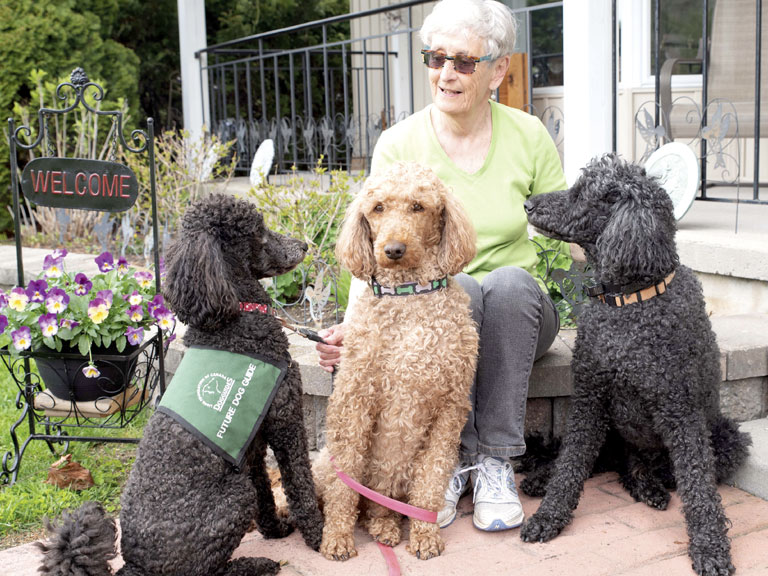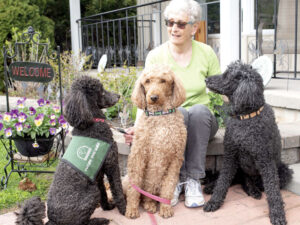County News
Walk for Dog Guides

Canine companions provide a vital service
The Lions Foundation of Canada established a program in 1985 to provide service dogs to blind and visually impaired Canadians. It soon became apparent the dogs were capable of so much more and the founding Canine Vision Canada program was expanded into a number of other areas. Service and companion dogs are now being provided in six other programs, including dogs for people with impaired hearing, dogs for diabetics and dogs for autism assistance. The dog breeds used in these programs are chosen for their temperament, intelligence and willingness to work, and include Labrador retrievers, golden retrievers and standard poodles. The actual service dog training starts when the dog is about a year old, after it has been trained in basic obedience and social skills by a foster parent, and the dog has a working career of about eight to 10 years. These dogs are available at no charge to applicants to the program and it costs about $25,000 to train each animal. The Dog Guides receives no government funding, and all of its operating costs are covered by donations and fundraising.
The biggest fundraising event is the annual Walk for Dog Guides. Normally, a group of people would obtain pledges to walk their dogs a certain distance, and the funds collected would be donated to Dog Guides. With the ongoing pandemic, however, the walk has taken on a virtual spin. Participants will now take their pledges online and walk with their dogs as individuals, rather than in a group. The national goal for this event is $1.3 million, and the Lions Clubs in this area have set a goal of $12,000. With just over two weeks to go before the walk on May 30, the Prince Edward County Lions, Belleville Lions, Trenton Lions and Stirling Lions have raised close to $7,000. Janet Marrisen is with the PEC Lions Club, and has been involved with the Dog Guides for 22 years. She and her husband, Harry, have fostered 19 Dog Guide puppies, and currently have two adult dogs that were adopted through the program. They are currently fostering a puppy as well. “I love dogs, and this is something I can do for somebody else,” says Janet Marrisen. “Unlike children, the puppies come with an instruction manual. We have the very basic obedience—sit, come, stay—but the biggest thing is socializing. Generally speaking, we’re out once a day or sometimes more, socializing them in different places, because that’s what they are going to have to do. Right now, the only place we’re going is into the grocery store, but ordinarily everywhere I go, the dog would go.” After staying with a foster family for about a year, the dogs go on the get specific training. “The first thing they do is assess them to see what program they think would be a best match for them, and the trainers have very specific skills they are looking for. If it’s for a diabetic alert, they have to start teaching them certain smells and getting them used to that. If it’s for someone blind, they have to do a whole other set of skills.” One of the biggest demands at present is for autism assist dogs.

PEC Lions Club member Janet Marrisen sits with (L-R): puppy-in-training Twilee, and adopted dogs Roblin and Eddy.
“So many kids benefit from having a dog to help them and comfort them,” adds Marrisen.
Not all dogs make it through the rigorous training. Some of these dogs are placed for adoption, and there’s a very long waiting list. Other dogs are assigned to a facility such as a hospital or courtroom, where they live with a staff member and are brought in to work to provide comfort and support to patients or clients. Some dogs are sent to border services agencies and trained to sniff out contraband. One dog raised by the Marrisens was luckier than most. This dog had excellent characteristics and was recruited as a stud dog, to pass those characteristics along to his offspring. He is now retired and back with the Marrisens after fathering 101 puppies. Dog Guides have helped thousands of Canadians lead more productive and satisfying lives, and have made a huge difference to
their health and well-being. The program is expensive to run, and it’s a lot of work for the volunteer foster family to provide the initial training. “It’s a labour of love,” says Janet Marrisen “We have to raise all the money to provide these dogs to people at no cost, right across Canada. We breed the dogs, train the dogs, place the dogs, and we are part of their lives until they are retired.”
For more information about Dog Guides, or to make a donation, please visit walkfordogguides.com and search for “Quinte Area Lions” after clicking on the Donate tab.

Comments (0)